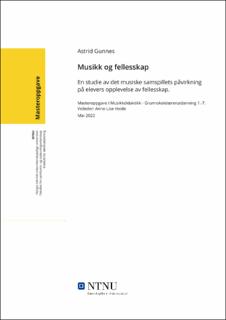| dc.contributor.advisor | Heide, Anne-Lise | |
| dc.contributor.author | Gunnes, Astrid | |
| dc.date.accessioned | 2022-07-19T17:23:42Z | |
| dc.date.available | 2022-07-19T17:23:42Z | |
| dc.date.issued | 2022 | |
| dc.identifier | no.ntnu:inspera:113335787:37135701 | |
| dc.identifier.uri | https://hdl.handle.net/11250/3007082 | |
| dc.description.abstract | Sammendrag
Gjennom problemstillingen «Hvordan påvirker samspill i musikkfaget elevers opplevelse av fellesskap?» søker masteroppgaven «Musikk og fellesskap» å finne ut av hvordan elevene opplever musikkfaget, og rent spesifikt samspillsaktivitetene i faget, inn mot temaet fellesskap.
For å kunne svare på problemstillingen ble det utarbeidet to forskningsspørsmål: «Hvilke sosiale aspekter påvirker elevene i samspillet?», og «Hvilke felles-skapende opplevelser får elevene gjennom samspillet?». Disse spørsmålene har fungert som veiledende spørsmål i utarbeidingen av intervjuguiden, og i konklusjonen.
Med fenomenologisk hermeneutikk som vitenskapsteoretisk posisjonering, og en induktiv tilnærming, inntar jeg et elevperspektiv på fellesskapsbygging i musikkfaget. Problemstillingen belyses gjennom semi-strukturerte intervjuer med 6 mellomtrinns-elever og utfyllende observasjoner av musikkundervisning med samspill som aktivitet. Datamaterialet har blitt analysert og kategorisert i flere omganger i henhold til IPA-metoden, og visualisert gjennom to flytskjema før det til slutt har blitt drøftet opp mot relevant teori og forskning innen fagfeltet.
Resultatene viser at elevene uttrykker opplevelsene sine i en mindre eksplisitt form. Man kan imidlertid få tilgang til elevenes felles-skapende opplevelser gjennom videre drøfting av sosiale og musikalske aspekter, samt de semi-strukturerte intervjuene. Det kom blant annet fram at elevene kjenner på en form for isbrytereffekt rett etter musikktimene, altså at de kjenner på et fellesskap med hverandre. Musisk samspill virker også oppbyggende for vennskapet mellom elevene og man kan si at musiseringen kan ha en konfliktdempende effekt. Gjennom arbeid med samspill i musikkfaget jobber elevene mot et felles mål med læreren som pådriver for støtte, oppmuntring og tilrettelegging for et godt musisk samspill. Gjennom studien har jeg også funnet at ferdighetene som kreves for å få til et musisk samspill kan bidra til at elevene får tilgang til noen felles-skapende opplevelser. Det samme gjelder når elevene lytter aktivt til hverandre og spiller sammen. Et aspekt som også ble grunnlag for drøfting, var elevenes opplevelse av musikkens egenverdi. Musikkfaget er en god arena for å bygge fellesskap, men elevenes opplevelse av samspill og øving på instrumenter er også lystbetont og indre motivert.
Nøkkelord:
Musikk, samspill, fellesskap, motivasjon, mestring, grunnskole, elevperspektiv. | |
| dc.description.abstract | Abstract
Asking: “How does musical interaction affect the students community-experiense in the music subject?” The masters theesis “Music and community” seeks to find out how students experiense the music subject, and more spesiffic the act of playing together.
To be able to answer the masters theesis, two reesearchquestions were prepared: “Which soscial aspects affect the students during the interaction?”, and “What community-promotional experiences do the students get through the musical interaction?”. These questions have served as guiding reesearchquestions during the preraration of the interview guide, and in the conclusion.
With phenomenological hermeneutics as my theorethical point of wiew, and an inductive approach, Im searching the students perspective on the matter of building community within the music subject. The problem of matter is eluciated through semi-structured interviews with 6 intermediate students and complementary observations of music teaching with musical interaction in focus. The data has been analyzed and categorized in several rounds according to the IPA-method, and visualized through two models, before it finally got discussed through relevant theory and research in the field.
The results show that the students don’t express their experiences explicitly, but that one can gain access to the students expiriences of community through further discussion of social and musical aspects, as well as the students experiences found in the interviews. It was revealed, among other things, that the students tend to feel an icebreaker effect right after the music lessons, in other words they feel community with each other. Musical interaction also has a constructive effect on the friendship between the students and it can be said that musical interaction can have a conflict-reducing effect. Through musical interaction within the music subject, the students work towards a common goal with the teacher who pushes for support, encouragement and facilitation for a good session. Through the study, I have also found that the skills required to manage the act of playing together can contribute to the students gaining access to some community expiriences. The same applies when the students listen activly to each other, and interacts through music. One aspect that also became a theme for discussion was the students experience of the intrinsic value of music. The music subject is a good arena for building community, but the students´experience of musical interaction as a plesurable and internally motivated matter is also very important.
Keywords:
Music, musical interaction, community, motivation, self-efficasy, primary-school, students perspective. | |
| dc.language | nob | |
| dc.publisher | NTNU | |
| dc.title | Musikk og fellesskap
En studie av det musiske samspillets påvirkning på elevers opplevelse av fellesskap. | |
| dc.type | Master thesis | |
